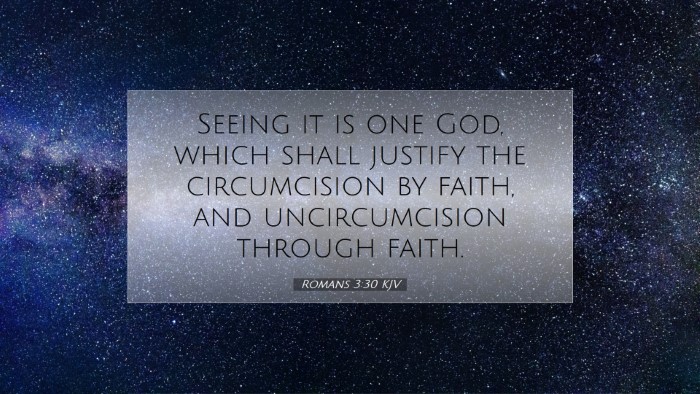Romans 3:30 Commentary
Romans 3:30 states, "Seeing it is one God, which shall justify the circumcision by faith, and uncircumcision through faith." This verse encapsulates a crucial theological truth regarding the nature of God’s justification for both Jews and Gentiles. The significance of this passage can be further illuminated through the insights of prominent public domain commentators.
Introduction to the Doctrine of Justification
The concept of justification is central to Pauline theology and is pivotal for understanding the broader implications of Christian salvation. Commentary from Matthew Henry emphasizes that this verse reveals the singularity of God in the process of justification. Regardless of one’s cultural or religious background, the same God justifies both the circumcised (Jews) and the uncircumcised (Gentiles) by faith, thereby establishing a fundamental equality among believers.
The Unity of God and Justification
Albert Barnes comments that the phrase "one God" is profoundly significant. It suggests that all humanity is accountable to the same divine authority, and it underscores the universality of God's mercy. Barnes elucidates that justification depends exclusively on faith and not on the adherence to the Mosaic Law, which had been a source of division between Jews and Gentiles. Thus, the implications of this verse promote unity within the body of Christ, transcending ethnic and cultural barriers.
Faith as the Means of Justification
The distinction made in the latter part of the verse between the "circumcision by faith" and the "uncircumcision through faith" is rich with meaning. Adam Clarke notes that Paul here makes a critical distinction about how both groups are reconciled to God. For the circumcised, their faith affirms God’s covenant and their relationship with Him, acknowledging a heritage that points to Christ. For the uncircumcised, their faith in Christ signifies the breaking of barriers and the initiation of a new understanding of faith as the means of righteousness.
Theological Implications
The implications of this theological insight are far-reaching. Justification by faith negates any claim to righteousness through works. This sentiment resonates deeply with Henry’s commentary, where he elucidates that both Jew and Gentile, regardless of their previous standing, find equal footing at the cross. This democratization of faith calls for humility and leads believers toward a posture of gratitude rather than pride in their heritage or works.
Counteracting Division and Promoting Unity
In a practical sense, this verse serves as a powerful reminder of the unity that must exist within the Church. Barnes affirms that if God, the great unifier, offers justification to both groups through faith, then believers must also strive to maintain this unity among themselves. The presence of division within the Church stands in stark contrast to God’s intentions as expressed in this verse.
Faith as a Unifying Principle
Clarke's exploration of faith as the unifying principle calls believers to focus not on their differences but on their commonality in Christ. This is a call to action for pastors and church leaders to foster environments that reflect this inclusive nature of faith. Exegetically, this points to the fact that all believers, regardless of background, are equally justified before God, cultivating a spirit of fellowship and collaboration in the mission of the Church.
Conclusion
Conclusively, Romans 3:30 serves as a theological cornerstone for understanding Christian identity across diverse backgrounds. The insights from Matthew Henry, Albert Barnes, and Adam Clarke provide a rich tapestry of interpretation that informs and challenges readers to embrace the radical inclusivity of the Gospel message. Justification by faith is not merely a doctrine to be studied; it is a lived reality that promises transformation and unity in the Body of Christ. This profound truth should inspire ongoing reflection, preaching, and teaching among pastors, students, and theologians alike.


